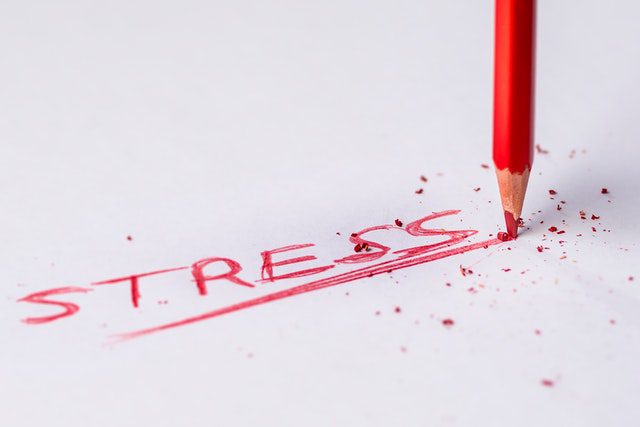If you’ve ever had a stressful day (or year!) that affected your eating habits, you are definitely not alone. A recent study found that more than 75% of adults said stress turned them into a meal skipper or stress eater, at least once during the past month.
And for many, it happens weekly.
Table of Contents
That stress might lead to:
- Overeating or constant snacking
- Craving salty, sugary, or high-fat foods
- Skipping meals entirely because you “just don’t feel like eating”
- Losing your appetite for days at a time
Here’s the thing: when your body is under stress, it changes how it processes hunger and food. It’s not a matter of willpower—it’s biology. And understanding why this happens is the first step to doing something about it.

Why Stress Messes with Your Appetite
In the short term:
- Adrenaline can temporarily suppress your appetite.
- Cortisol can increase cravings for quick energy—especially sugary, salty, or fatty foods.
- Insulin may also increase as your body anticipates needing more energy quickly.
Not only can these hormones mess with your hunger cues, but they can also encourage your body to store more fat, particularly in the abdominal area. That means even if you’re eating the same things, you may notice more bloating or stubborn weight gain during high-stress periods.
So no, it’s not just in your head… and it’s definitely not a personal flaw. It’s a physiological response.
But you can take control. You can support your body and your brain in those high-stress moments and protect your well-being in the process.
4 Practical Tips for the Stress Eater (Or Meal skipper!)
If you notice yourself eating out of stress, or losing your appetite altogether, try these four quick strategies:
1. Acknowledge what’s going on.
Notice what’s actually happening. If your appetite disappears or you turn into a stress eater and find yourself elbow-deep in a bag of chips, pause for a moment and ask: What’s really bothering me right now?
Identifying the source of stress can help you address the root instead of reacting with food.
2. Move your body.
You don’t need an intense workout. A 10-minute walk, some gentle stretching, or dancing to a favorite song can do wonders.
Movement helps regulate your nervous system, lower cortisol, and improve mood—which can all help you reset and reconnect with what your body actually needs.
3. Breathe or meditate.
It only takes five minutes. Deep breathing, mindfulness, or a short guided meditation can calm your stress response and bring you back into balance.
Try box breathing (inhale 4, hold 4, exhale 4, hold 4) or a free meditation app to get started.
4. Talk it out.
Sometimes, you just need to say it out loud. A quick chat with a friend, journaling your thoughts, or getting professional support can help you process what’s weighing on you and make room for healthier responses.
Stress eating (or skipping) isn’t about weakness, it’s about overwhelm. But you can take small, doable steps to feel better and more in control.
And if this is something you deal with often, you’re not alone. Reach out for support. You deserve to feel your best even during life’s toughest seasons.
Ready to break the stress-eating cycle? Start with these tips today and be kind to yourself along the way.
FAQ: Stress Eaters, Meal Skippers, and How to Regain Control
Q: Is being a stress eater the same as emotional eating?
A: They’re closely related. Stress eating happens when your body responds to stress hormones, often making you crave high-calorie, high-fat foods. Emotional eating is a broader term and can be triggered by a variety of feelings like sadness, boredom, loneliness, or even happiness. Both are about using food to cope with feelings rather than hunger.
Q: I lose my appetite completely when I’m stressed. Is that normal?
A: Yes, it’s actually very common. Some people experience a surge of adrenaline during stress, which can suppress appetite. While this is a normal short-term response, regularly skipping meals can disrupt your metabolism and energy levels. Try small, nutrient-dense snacks if full meals feel overwhelming.
Q: What should I eat when I’m stressed?
A: Focus on foods that support your nervous system: complex carbs (like oats, sweet potatoes, or brown rice), lean proteins, healthy fats, and plenty of hydrating fruits and vegetables. Avoid relying on sugar or caffeine, which can make stress worse over time. If you’re not sure what to eat, start with something simple like a smoothie or a piece of fruit with nut butter.
Q: How do I know if I need professional help for stress eating?
A: If stress or emotional eating is impacting your physical or mental health, or if you feel out of control around food, it’s a good idea to reach out to a registered dietitian, therapist, or health coach. You don’t have to navigate it alone, and support can make a huge difference.
Q: What if I know I’m a stress eater, but I can’t stop?
A: Awareness is a powerful first step. Try creating a short pause between the feeling and the action, like taking a few deep breaths, drinking a glass of water, or going for a walk. Over time, building alternative coping habits (like journaling, calling a friend, or moving your body) can help retrain your response to stress.


), //www.fitnesslifestylellc.com/wp-content/uploads/2024/10/3076514.jpg))

), https://www.fitnesslifestylellc.com/wp-content/uploads/2024/10/3076514.jpg))













